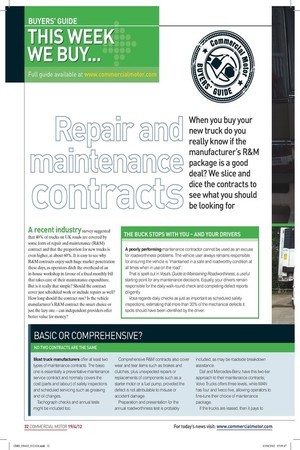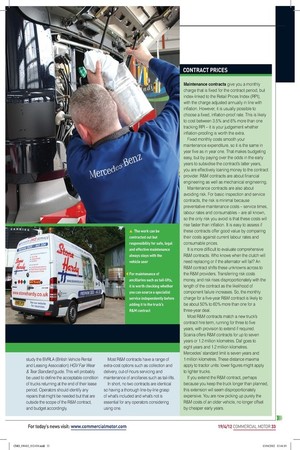BASIC OR COMPREHENSIVE?
Page 25

Page 26

If you've noticed an error in this article please click here to report it so we can fix it.
NO TWO CONTRACTS ARE THE SAME Most truck manufacturers offer at least two types of maintenance contracts. The basic one is essentially a preventative maintenance service contract and normally covers the cost (parts and labour) of safety inspections and scheduled servicing such as greasing and oil changes.
Tachograph checks and annual tests might be included too. Comprehensive R&M contracts also cover wear and tear items such as brakes and clutches, plus unexpected repairs or replacements of components such as a starter motor or a fuel pump, provided the defect is not attributable to misuse or accident damage.
Preparation and presentation for the annual roadworthiness test is probably included, as may be roadside breakdown assistance.
Daf and Mercedes-Benz have this two-tier approach to their maintenance contracts; Volvo Trucks offers three levels, while MAN has four and Iveco five, allowing operators to fine-tune their choice of maintenance package.
If the trucks are leased, then it pays to study the BVRLA (British Vehicle Rental and Leasing Association) HGV Fair Wear & Tear Standard guide. This will probably be used to define the acceptable condition of trucks returning at the end of their lease period. Operators should identify any repairs that might be needed but that are outside the scope of the R&M contract, and budget accordingly. Most R&M contracts have a range of extra-cost options such as collection and delivery, out-of-hours servicing and maintenance of ancillaries such as tail-lifts.
In short, no two contracts are identical so having a thorough line-by-line grasp of what’s included and what’s not is essential for any operators considering using one.











































